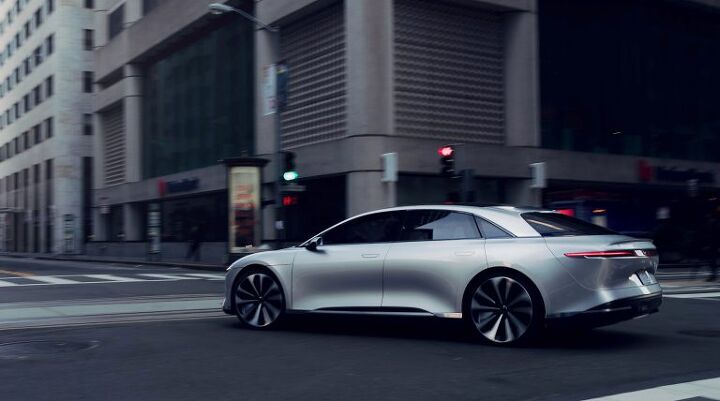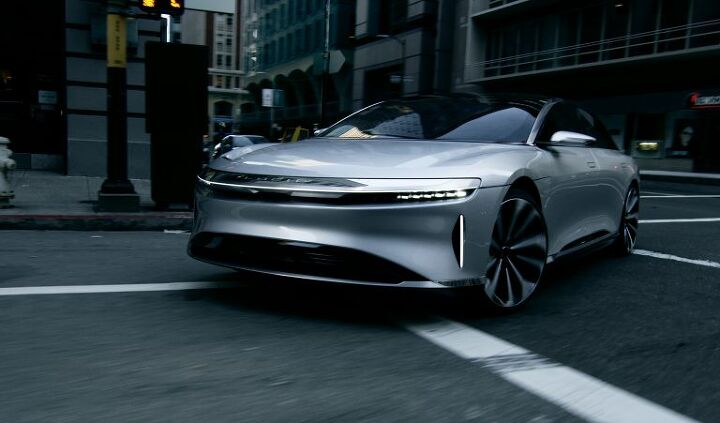As Elon Musk Hunts Saudi Funding, Saudi Arabia Is Ready to Invest in a Tesla Rival: Report

It’s not a done deal just yet, but a high-tech Tesla rival, headquartered just a few miles away from Elon Musk’s Palo Alto, California base of operations, might receive the Saudi funding the Tesla CEO so desperately craves.
According to sources who spoke to Reuters, PIF, Saudi Arabia’s sovereign wealth fund, is ready to pour $1 billion into Newark, California-based Lucid Motors. The two entities have reportedly drawn up a term sheet for the deal, which would see the the Saudis become a majority owner of the private automaker.
What does Lucid have to offer the Saudis in return for the investment? A large, technologically advanced automobile.
Lucid Motors made a splash at the 2017 New York auto show with its Air — an electric sedan with style and range to spare. First revealed in December of 2016, the Air promises Mercedes-Benz E-Class-like size and S-Class-like interior volume, with pampered occupants able to travel up to 400 miles between charges.
To build the Air, Lucid needs cash. Last year saw the company push back the anticipated start of production to 2019 amid ongoing fundraising. The company hopes to build an assembly plant in Arizona in three phases, with mass production taking place by early next decade. Should the quarter-trillion Saudi fund come through, Lucid has it made.
Per the term sheet, PIF would initially invest $500 million, the sources said, with two subsequent cash dumps tied to production milestones. Though the Saudi fund remains bullish about the potential return from startup electric car makers, recent large investments in other ventures means PIF can’t fling money around with reckless abandon.
That’s something Musk might be dismayed to hear of. Tesla’s CEO said last week that he expects the Saudi sovereign wealth fund to put up much of the money needed to take his company private, though there’s no ironclad deal to back up his “funding secured” tweet at the moment.
While Lucid generated copious amounts of hype by playing up the most impressive Air model, the vehicle’s range actually starts at a modest $52,500 after a federal tax credit. For that sum, buyers would receive a sedan with 240 miles of range. Further up the trim ladder lies a 100 kWh and 130 kWh battery pack, capable of taking the Air 315 and 400 miles between charges, respectively. A planned twin-motor, all-wheel drive model reportedly packs 1,000 combined horsepower, warranting a six-figure price tag.
[Images: Lucid Motors]

More by Steph Willems
Latest Car Reviews
Read moreLatest Product Reviews
Read moreRecent Comments
- 1995 SC If the necessary number of employees vote to unionize then yes, they should be unionized. That's how it works.
- Sobhuza Trooper That Dave Thomas fella sounds like the kind of twit who is oh-so-quick to tell us how easy and fun the bus is for any and all of your personal transportation needs. The time to get to and from the bus stop is never a concern. The time waiting for the bus is never a concern. The time waiting for a connection (if there is one) is never a concern. The weather is never a concern. Whatever you might be carrying or intend to purchase is never a concern. Nope, Boo Cars! Yeah Buses! Buses rule!Needless to say, these twits don't actual take the damn bus.
- MaintenanceCosts Nobody here seems to acknowledge that there are multiple use cases for cars.Some people spend all their time driving all over the country and need every mile and minute of time savings. ICE cars are better for them right now.Some people only drive locally and fly when they travel. For them, there's probably a range number that works, and they don't really need more. For the uses for which we use our EV, that would be around 150 miles. The other thing about a low range requirement is it can make 120V charging viable. If you don't drive more than an average of about 40 miles/day, you can probably get enough electrons through a wall outlet. We spent over two years charging our Bolt only through 120V, while our house was getting rebuilt, and never had an issue.Those are extremes. There are all sorts of use cases in between, which probably represent the majority of drivers. For some users, what's needed is more range. But I think for most users, what's needed is better charging. Retrofit apartment garages like Tim's with 240V outlets at every spot. Install more L3 chargers in supermarket parking lots and alongside gas stations. Make chargers that work like Tesla Superchargers as ubiquitous as gas stations, and EV charging will not be an issue for most users.
- MaintenanceCosts I don't have an opinion on whether any one plant unionizing is the right answer, but the employees sure need to have the right to organize. Unions or the credible threat of unionization are the only thing, history has proven, that can keep employers honest. Without it, we've seen over and over, the employers have complete power over the workers and feel free to exploit the workers however they see fit. (And don't tell me "oh, the workers can just leave" - in an oligopolistic industry, working conditions quickly converge, and there's not another employer right around the corner.)
- Kjhkjlhkjhkljh kljhjkhjklhkjh [h3]Wake me up when it is a 1989 635Csi with a M88/3[/h3]

































Comments
Join the conversation
Lose $1 billion on Lucid or $70 billion on Tesla? Portfolio managers have such difficult decisions.
Watch out for your corn hole, Elon